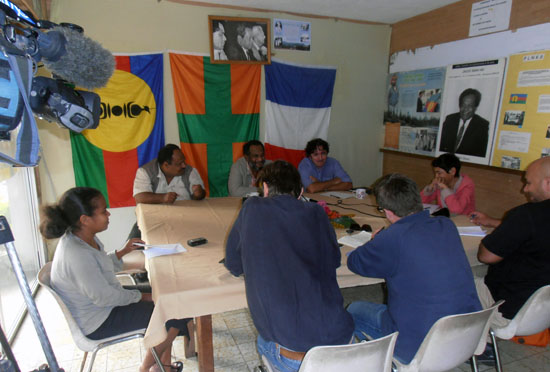
OPINION: In New Caledonia, the role of the media in democracy is an issue still evolving. For more than 25 years, it has reflected more of propaganda journalism than the role of playing a part in "building democracy".
The media at present reflects the political, cultural, history and economic situation of New Caledonia.
The media landscape has not evolved to satisfy information needs of the growing and diverse population because it is controlled politically and financially.
For example, the main radio stations are funded by the local institutions which are run by members elected on political programmes.
But the main paradox over media in New Caledonia involves the Conseil Superieur de l’Audiovisuel (CSA - the metropolitan High Authority on Media) in France, which deliberates on applications for new radio frequencies and issues broadcast licences for either TV or radio.
Although local institutions and partners have secured funding and trained personnel to staff the new TV broadcasting station, the CSA has delayed decisions to allow for this TV operate.
However, two TV projects are underway for approval by the CSA, but both have political connotations. The launch of new radio broadcast stations is also regarded as a "threat" to some of the political powers. The CSA refused five new projects last year, saying that “the actual radio landscape in New-Caledonia guarantees pluralism".
French-owned media
In addition, there is only one daily newspaper, Les Nouvelles Calédoniennes, and only one public television station (RFO), which are both owned by French companies. Such monopoly of the media contributes to the poverty of the information and biased reporting provided to the public in New Caledonia.
Moreover, viewers have access only to information from France via Channel Sat and digital terrestrial TV.
Although a political balance is applied through Radio Djiido, (RDK), a pro-independence radio, and Radio Rythme Bleu, (RRB), an anti-independence station, the majority of media on the market do not have clear, readable and even responsible editorial policies.
The objective behind the creation of the Radio Djiido was to “counterbalance” biased information spread by the anti-Independence political groups. But because of the foreign media, RDK, hardly fulfils this expectation, especially because of the lack of staff.
Radio Océane, a shortwave radio broadcasting only in Noumea and its periphery, as well as the weekly magazine Infos have survived for a few years after trying to make a difference, but still affected by funding issues.
The monthly satirical newspaper Le Chien bleu (The Blue Dog) offers alternative and inside views to local news and politics but does not provide reliable sources for the public to really appreciate the basis of its claims.
Freedom of the press and plurality of information is yet to improve in this developing country to inform a wider public and help build democracy.
Limited scrutiny
Local journalists themselves refrain from closer scrutiny and analysis which would not please local politicians.
New Caledonia is a small territory where everyone effectively knows everybody.
Only few try to make to make the difference as for example the editor-in-chief of RRB. She is well known in the profession for her commitment in her political party and her writing is often controversial regarding the ethics and the fairness, but RRB just has their editorial policy and everyone in NC is aware about it.
In June, she got chased from a press conference of a political party Caledonia Together, which explains their decisions as she is not regarded as "fair and balanced" in her stories.
Both the radio station and the political party filed a complaint but the lack of legislation or a legal framework to guarantee ethics and freedom of the press, and freedom of information, has been the situation over many years.
A "journalism of validation rather than a journalism of investigation", which has seriously damaged the pillar of democracy and seems to give the rights to politicians to decide whether some stories are ethical or not.
The advertising market of New Caledonia is restricted and the local media cannot really survive without funds from the local institutions and support from local parties and politicians.
Colonial heritage
In addition, professional careers of local journalists who return from France after their studies have only one ambition to shine on "France Television". This is a result of "the colonial heritage in force in our tropics" for those who prefer salary and prestige rather than being patriotic in their profession and ensuring quality of information delivered to the public.
Generally, the media in New Caledonia base their reporting on fed-information such as press conferences, media releases and prepared statements and do not venture into further investigations to establish the pros and cons of issues.
This leaves the general public uninformed of both sides of the story and can lead to major concerns and consequences on the social and political developments of the country. This may be explained by a lack of staff, budget and personal commitment or simply biased reporting to sustain financing and political support.
Others will say that it is fortunate to have other channels of information through magazines published by private business or Institutions and of course, the news media - for those who have access on the internet and the social media. But it still is a very small part of the population of New Caledonia who are familiar with this.
Political parties also have their monthly newspaper or bulletin and/or website for the main purpose of propaganda information.
In conclusion, the media in New Caledonia lacks balance, fairness and transparency. The media is an important political issue and dreaming of having a "free press" nowadays is more of a utopia if the media landscape remains as it is.
With its political evolution towards more emancipation, New Caledonia really needs a more diversified media to lead the country towards a true democracy for greater independence of information.
This work is licensed under a Creative Commons Attribution-NonCommercial 3.0 New Zealand Licence.
MEDIA AND DEMOCRACY
Conference at USP, 5/6 September 2012
'Leeway' in decree, says Sun deputy editor
More iTaukei dailies needed, says linguist
Opinion - Rumblings at the Edgefest
Wansolwara special reports on media and democracy
Social media the news medium of the future in Pacific
Journalists told 'be part of solution'
Fiji journalists urged to take advantage of lifting of censorship




